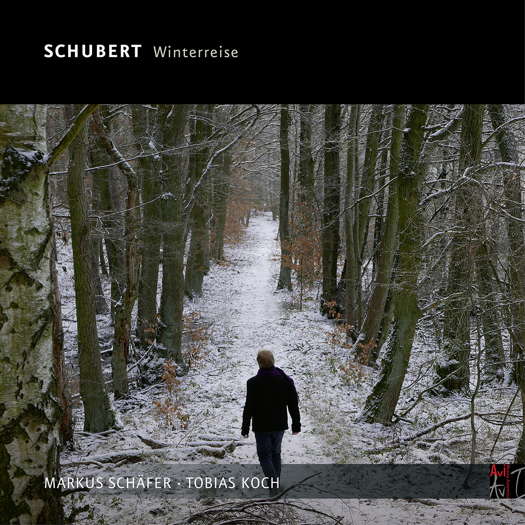 UPDATES: There's a new feature every day at Classical Music Daily. Read about the various ways we can keep in touch with you about what's happening here.
UPDATES: There's a new feature every day at Classical Music Daily. Read about the various ways we can keep in touch with you about what's happening here.
- New York Philharmonic
- Paavo Berglund
- Ernest Hall
- Adam Abeshouse
- Curlew River
- St John's Church Buxton
- Vladimir Ashkenazy
- Rainer Maria Rilke
 DISCUSSION: What is a work? John Dante Prevedini leads a discussion about The performing artist as co-creator, including contributions from Halida Dinova, Yekaterina Lebedeva, Béla Hartmann, David Arditti and Stephen Francis Vasta.
DISCUSSION: What is a work? John Dante Prevedini leads a discussion about The performing artist as co-creator, including contributions from Halida Dinova, Yekaterina Lebedeva, Béla Hartmann, David Arditti and Stephen Francis Vasta.

Utterly Different
Schubert's 'Winterreise' by Markus Schäfer and Tobias Koch, reviewed by PATRICK MAXWELL
'Both performers are very good musicians.'
Classical music is a niche world, and Lieder another niche inside that. It seems to appeal only to a lucky small crowd, and comes with its own visual set-up: the impressive piano spread out over the stage with an Alfred Brendel-like player nodding his way through the accompaniment, while the bow-tied singer is encased in the hold of the instrument while he gets through each number. It is one of the most intimate forms of music making; the two performers can create both almost symphonic levels of complexity at one moment, and at the next be reduced to the barest lines of melody and accompaniment. To an extent, Lieder is dominated by personality, by those standing up to deliver their songs, more than an orchestra is by their first clarinettist, or even a soloist in an oratorio or concerto. It draws in a select crowd, one that knows what they're in for, and is relying on the singer to give them a new interpretation, something different beyond the bare bones of the score, more so than a choir or chamber ensemble can normally achieve.
This is due mainly due to song's obvious link to the words, written before any notes and most often bearing the greater 'meaning'. Singers such as Ian Bostridge approach Lieder with a definite equality between appreciation of the words and their musical adaptation, while one like Fischer-Dieskau was more able to combine the two into something more rounded, though without Bostridge's more impactful, emotive intensity. Markus Schäfer's new recording with his fellow German accompanist Tobias Koch has something of that same vigour, but it's also utterly different from the formal recitals of the work Schubert devotees will be used to.
This is to be welcomed; great works like Winterreise need frequent re-appraisal. But here, Schäfer and Koch have based their appraisal on simply adding more notes. In a search for 'more spontaneity' and 'individuality', they have relied too much on the most obvious colourings and decorations to the score, not on the myriad opportunities Schubert gives for re-interpretation within his own score.
Their approach is obvious from the first song, the heavy tread of the piano in 'Gute Nacht' on the D minor chord, the strophic music giving a sense of inevitability at the start of the narrator's winter journey which almost seems out of place as the first number.
Listen — Schubert: Gute Nacht (Winterreise)
(track 1, 0:00-0:59) ℗ 2021 C-AVI :
It's a different world from the brightness of Die Schöne Müllerin right from the first bar. Koch starts his experimentation with a canon of the melody, while Schäfer takes plenty of liberties with both the tempi and upper range, completing the top notes of any scales when it seems to fit. The two have opted for an unusually high pitch for much of the cycle, which makes any reaches beyond the score seem misjudged, particularly when the tuning wavers.
Schäfer undoubtedly has a very enticing voice, and both fully relish and often realise the intricacies of the music. But too much of this recording is pleased with itself. The listener has to be constantly on the edge for the latest turn in speed or range. 'We, as historically informed performers ... plead in favour of the listening habits of Schubert's day', the sleeve notes pompously inform us. Yet it seems unlikely that Schubert would have performed the songs to his friends for the first time in 1827 in any way like these two have done, unless he really was in a rush. Searching for more experimentation too often drives Schäfer to overdo his words at the expense of the notes and phrases, particularly in the notionally simple 'Der Lindenbaum', the only song of twenty-four which Franz von Schober told Schubert he was fond of at first hearing.
Listen — Schubert: Der Lindenbaum (Winterreise)
(track 5, 1:31-2:27) ℗ 2021 C-AVI :
Tuning becomes an issue at several points, especially in dramatic ascending parts of the usually serene 'Frülinghstraum'.
Listen — Schubert: Frülinghstraum (Winterreise)
(track 11, 0:00-0:52) ℗ 2021 C-AVI :
More than anything, the torrid Winter's Journey, the greatest song cycle Schubert created, and high above any other competitors, has to be that very journey.
Listen — Schubert: Das Wirtshaus (Winterreise)
(track 21, 0:50-1:46) ℗ 2021 C-AVI :
For too much in this disc, the reader is not so much captured by the performance and drawn in to see Wilhelm Müller's narrator as Schubert imagined him, as thrown around with the words hurled in their face.
Listen — Schubert: Gefror'ne Tränen (Winterreise)
(track 3, 1:04-1:34) ℗ 2021 C-AVI :
Both performers are very good musicians. But in an effort to drive some life into such a well-trodden path and wholesomely emotional music, they exposed the limits of such interpretations. All too often, I just wanted to listen to Ian Bostridge again.
Copyright © 9 September 2021
Patrick Maxwell,
Buckinghamshire, UK

CD INFORMATION: WINTERREISE - MARKUS SCHÄFER, TOBIAS KOCH


